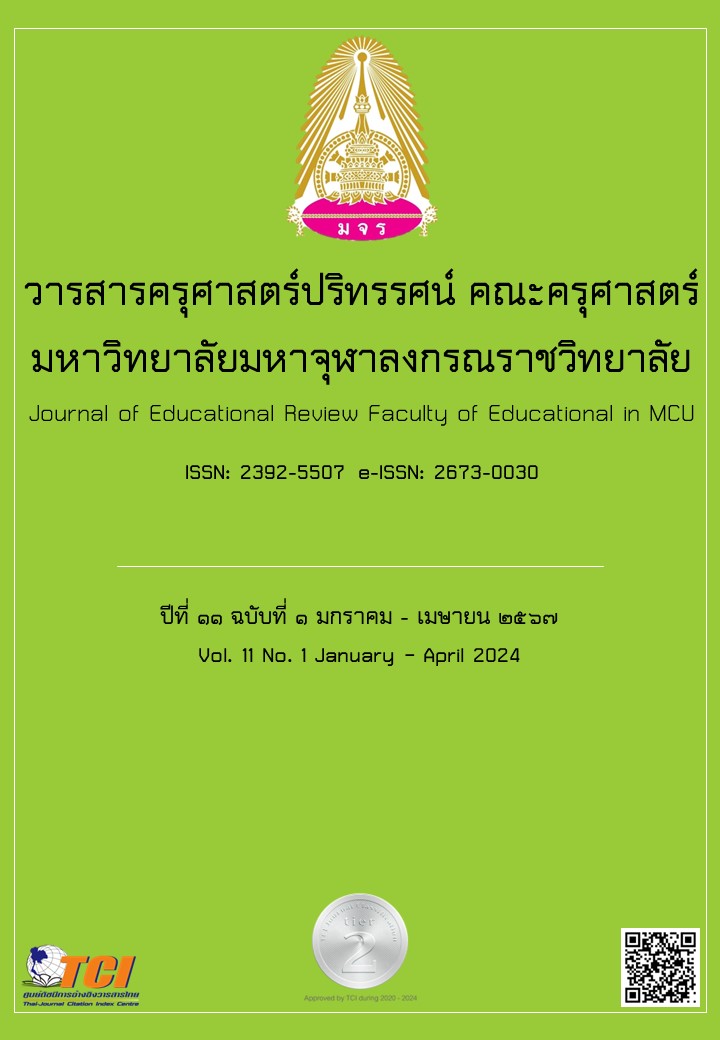สภาพและแนวทางการบริหารการจัดการอาชีวศึกษาในพื้นที่นวัตกรรมการศึกษา: กรณีศึกษาวิทยาลัยเทคนิคระยอง
Main Article Content
บทคัดย่อ
บทความวิจัยนี้มีวัตถุประสงค์เพื่อศึกษาสภาพและแนวทางการบริหารการจัดการอาชีวศึกษาในพื้นที่นวัตกรรมการศึกษา: กรณีศึกษาวิทยาลัยเทคนิคระยอง โดยดำเนินการดังนี้ 1) ศึกษาสภาพการบริหารการจัดการอาชีวศึกษาในพื้นที่ นวัตกรรมการศึกษา: กรณีศึกษาวิทยาลัยเทคนิคระยอง ด้วยการใช้แบบสอบถามกับกลุ่มตัวอย่าง จำนวน 350 คน ทำการวิเคราะห์ข้อมูลเชิงปริมาณด้วยสถิติพื้นฐาน ได้แก่
ค่าร้อยละ ค่าเฉลี่ย ส่วนเบี่ยงเบนมาตรฐาน 2) ศึกษาแนวทางการบริหารการจัดการอาชีวศึกษาในพื้นที่นวัตกรรมการศึกษา: กรณีศึกษาวิทยาลัยเทคนิคระยอง ด้วยการสัมภาษณ์ผู้ให้ข้อมูลสำคัญ จำนวน 9 คน ทำการวิเคราะห์ข้อมูลด้วยการวิเคราะห์เนื้อหา ผลการวิจัย พบว่า 1) สภาพการบริหารการจัดการอาชีวศึกษาในพื้นที่นวัตกรรมการศึกษา: กรณีศึกษาวิทยาลัยเทคนิคระยอง โดยรวมมีระดับการปฏิบัติอยู่ในระดับมาก และ 2) แนวทางการบริหารการจัดการอาชีวศึกษาในพื้นที่นวัตกรรมการศึกษา: กรณีศึกษาวิทยาลัยเทคนิคระยอง ประกอบด้วย (1) การจัดการศึกษาอาชีวศึกษาในพื้นที่นวัตกรรมการศึกษา 7 ด้าน ได้แก่ การบริหารฐานนวัตกรรม การบริหารสมรรถนะองค์การ การบริหารหุ้นส่วนองค์การ ภาวะผู้นำเชิงนวัตกรรม การพัฒนานวัตกร นวัตกรรมเชิงระบบ การบริหารแผนนวัตกรรม (2) กระบวนการบริหารแบบ POLC 4 ขั้นตอน ได้แก่ การวางแผน (Planning: P) การจัดองค์การ (Organizing: O) การนำ (Leading: L) และการควบคุม (Controlling: C) (3) ปัจจัยการพัฒนาวิทยาลัยในพื้นที่นวัตกรรมการศึกษา
Article Details

อนุญาตภายใต้เงื่อนไข Creative Commons Attribution-NonCommercial-NoDerivatives 4.0 International License.
ทัศนะและความคิดเห็นที่ปรากฏในบทความในวารสารฉบับนี้ถือเป็นความรับผิดชอบของผู้เขียนบทความนั้นเพียงผู้เดียว และไม่ถือเป็นทัศนะและความรับผิดชอบของกองบรรณาธิการ
กองบรรณาธิการขอสงวนสิทธิ์ในการคัดเลือกบทความลงตีพิมพ์และจะแจ้งให้เจ้าของบทความทราบหลังจากผู้ประเมินบทความตรวจอ่านบทความแล้ว
ต้นฉบับที่ได้รับการตีพิมพ์ในวารสารครุศาสตร์ปริทรรศน์ คณะครุศาสตร์ มหาวิทยาลัยมหาจุฬาลงกรณราชวิทยาลัย ถือเป็นกรรมสิทธิ์ของคณะครุศาสตร์ มหาวิทยาลัยมหาจุฬาลงกรณราชวิทยาลัย ห้ามนำข้อความทั้งหมดหรือบางส่วนไปพิมพ์ซ้ำ เว้นเสียแต่ว่าจะได้รับอนุญาตจากมหาวิทยาลัยฯ เป็นลายลักษณ์อักษร
เอกสารอ้างอิง
กระทรวงศึกษาธิการ. (2545). พระราชบัญญัติการศึกษาแห่งชาติ พุทธศักราช 2542 (ฉบับที่ 2) และที่แก้ไขเพิ่มเติม พุทธศักราช 2545. กรุงเทพมหานคร: สยามสปอรต์ซินดิเคท.
ทิพย์พาพร ตันติสุนทร. (2564). การลดความยากจนและความเหลื่อมล้ำทางการศึกษา. แหล่งที่มา https://www.csdi.or.th/2021/09/ending-poverty/ สืบค้นเมื่อ 1 มี.ค. 2565.
ประภาส เกตุไทย. (2556). การพัฒนากลยุทธ์การพัฒนาการบริหารการจัดอาชีวศึกษาระบบทวิภาคีใน วิทยาลัยเทคนิคกลุ่มภาคเหนือตอนล่าง. ดุษฎีนิพนธ์ปรัชญาดุษฎีบัณฑิต. มหาวิทยาลัยราชภัฏกําแพงเพชร.
พิศณุ ทองเลิศ. (2555). นวัตกรรมการบริหารงานอาชีวศึกษาระบบทวิภาคีในสถานศึกษาอาชีวศึกษา. ดุษฎีนิพนธ์ปรัชญาดุษฎีบัณฑิต. มหาวิทยาลัยศิลปากร.
ภูมิภควัธจ์ ภูมพงศ์คชศร. (2564). รูปแบบนวัตกรรมการบริหารโรงเรียนสังกัดสำนักงานเขตพื้นที่การศึกษาชลบุรี เขต 2. วารสารวิชาการ สถาบันเทคโนโลยีแห่งสุวรรณภูมิ. 7(1). 159-172.
วาทินี พูลทรัพย์. (2563). องค์ประกอบการบริหารโรงเรียนในพื้นที่นวัตกรรมการศึกษา. ดุษฎีนิพนธ์ปรัชญาดุษฎีบัณฑิต. มหาวิทยาลัยศิลปากร.
วิภาดา ศรีจอมขวัญ. (2556). รูปแบบบริหารการพัฒนาสมรรถนะครูอาชีวศึกษาไทย. ดุษฎีนิพนธ์ปรัชญาดุษฎีบัณฑิต. มหาวิทยาลัยรามคำแหง.
ศรเนตร อารีโสภณพิเชฐ. (2561). นวัตกรรมการบริหารการศึกษาสู่การเปลี่ยนแปลง 4 เรียนรู้. วารสารครุศาสตร์ จุฬาลงกรณ์มหาวิทยาลัย. 46(4). 534–553.
สำนักงานศึกษาธิการจังหวัดระยอง. (2562). แผนยุทธศาสตร์การศึกษาจังหวัดระยอง (2562-2565). ระยอง: สำนักงานศึกษาธิการจังหวัดระยอง.
สิริกาญจน์ ธนวุฒิพรพินิต และคณะ. (2563). หลักสูตรฝึกอบรมการประกันคุณภาพการศึกษาภายนอก ระดับการศึกษาขั้นพื้นฐาน. วารสารครุศาสตร์ปริทรรศน์ คณะครุศาสตร์ มหาวิทยาลัยมหาจุฬาลงกรณราชวิทยาลัย. 7(1). 121-132.
Krejcie, R.V. & Morgan, D.W. (1970). Determining Sample Size for Research Activities. Educational and Psychological Measurement. 30(3). 607-610.


